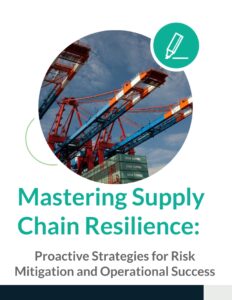Unveiling the Internal Supply Chain: Bridging Operational Gaps for Enhanced Efficiency and Business Success
If you have never heard of an internal supply chain, you are in luck. Oftentimes, when people think about the supply chain, they are only thinking about external components like raw materials, inbound and outbound logistics, or manufacturing. What many businesses fail to do is recognize and address their internal supply chain operational gaps effectively. This crucial aspect is where the internal supply chain’s significance and impact become evident. By pinpointing these operational gaps and implementing strategic improvements, businesses can streamline their operations and enhance overall efficiency within their supply chain processes.
First, what is an internal supply chain? An internal supply chain refers to the interconnected processes and functions within a business that contribute to the creation, production, and delivery of goods and services. It involves all departments and activities within a company, from procurement and operations to marketing and sales. By focusing on improving the efficiency and effectiveness of these internal processes, businesses can enhance their overall supply chain and ultimately, their bottom line.
It’s a chain of activities inside a company, including production, purchasing, sales, distribution, project management, and in-house manufacturing. When we think about internal operations, each component operates in a siloed environment. However, each siloed environment is interconnected and interdependent with the rest of the supply chain, so the question becomes, is your internal supply chain necessary?
The short answer is yes.
The internal supply chain plays an intricate role when producing the final product that will eventually be delivered to your customers. If there’s even one gap in your internal supply chain link, it will have a domino effect on all other areas and the final product. This could result in production delays, quality issues, and even unhappy customers. Furthermore, by optimizing the internal supply chain processes, businesses can reduce costs, improve speed and agility, and increase customer satisfaction.
It’s also crucial to continuously monitor and evaluate your internal supply chain performance to identify any areas that may need further improvement. By regularly reviewing and updating procedures, businesses can ensure their internal supply chain is functioning at its optimal level.
One major advantage of having a well-managed internal supply chain is cost savings. By streamlining processes and reducing waste, businesses can lower their operational costs. This also includes optimizing inventory levels and better-managing supplier relationships to negotiate better prices. Additionally, an efficient internal supply chain can lead to improved customer satisfaction through faster delivery times and better quality control.
Another benefit of an internal supply chain is improved communication and collaboration within a company. By breaking down silos between departments, employees can have a better understanding of how their actions impact the overall supply chain. This can lead to more efficient decision-making, problem-solving, and ultimately, increased productivity.
Furthermore, having a strong internal supply chain can also make a company more resilient and adaptable to unexpected disruptions. By having clear processes and procedures in place, businesses can better handle challenges such as supply chain disruptions, changes in customer demand, or economic downturns.
If one area, like project management, fails to communicate a timeline change, most of the time, it can be resolved quickly with minimal expense. However, in a manufacturing, shipping, and logistics setting, those remarkably simple tasks, can lead to enormous, expensive problems such as having the wrong dimensions, delaying the delivery date, or delivering to the wrong location.
For example, your company deals with raw materials. If the proper compliance documents are not filed, there can be legal ramifications. In other cases, the product would be built incorrectly, which is not helpful for your customers. Additionally, with current supply chain issues, raw materials are more difficult to replace, so ensure you have the correct specifications the first time.
It can be easy to point fingers at whoever did not receive or share the message with the right person. The bigger problem, than the lack of communication between historically siloed departments, is the lack of the right technology.
It is also important to regularly review and update internal supply chain processes to ensure they remain efficient and aligned with business goals. This can involve conducting periodic audits, seeking feedback from employees, and implementing continuous improvement initiatives.
Moreover, businesses should not overlook the importance of employee training and development in relation to the internal supply chain. Providing employees with the necessary skills and knowledge to effectively carry out their tasks can greatly enhance the overall performance of the internal supply chain.
Maintaining a well-organized internal supply chain is crucial for achieving success. Businesses that grasp and enhance these internal procedures can cut costs, enhance communication, foster collaboration, and ultimately outpace competitors. Remember to focus on refining your internal supply chain and persistently seek enhancement. The rewards will undoubtedly justify the long-term effort.
When reflecting on the supply chain, it’s crucial to analyze both external and internal elements for a comprehensive and effective operation. Moreover, businesses ought to set up reliable metrics to gauge the efficiency of their internal supply chain procedures. This approach aids in pinpointing areas that need enhancement and monitoring advancements over time.
How did we get here?
The internal supply chain predicament is a result of operationally inefficient processes such as the lack of technology adoption both internally and externally and stretching our human capital to the point of unsustainability. It’s impossible to automate everything. We will always need humans; they need to be tasked with smarter jobs. What I am suggesting is looking at today’s marketplace. We don’t need a ton of workers to make things more efficient. This is where technology becomes an imperative investment. We can capitalize on technology’s ability to automate manual tasks, allowing our human capital to do something more valuable.
The crucial role of technology in elevating the internal supply chain should not be underestimated. Utilizing advanced software and systems can greatly boost efficiency, accuracy, and communication within internal supply chain processes. Technology plays a key role in streamlining operations, from inventory management to order tracking and pinpointing areas for improvement.
Measure and Manage
Regularly reviewing and updating internal supply chain processes is vital to maintaining efficiency that aligns with business objectives. This may include performing routine audits, gathering input from employees, and introducing ongoing improvement strategies.
Businesses should place a strong emphasis on prioritizing employee training and development within the internal supply chain. By investing in equipping employees with the necessary skills, expertise, and ongoing learning opportunities, organizations can witness a substantial enhancement in the efficiency and productivity of the internal supply chain operations. This focus on continuous learning and skill development not only empowers employees to excel in their roles but also fosters a culture of growth and innovation within the company, ultimately leading to a competitive edge in the market.
Remember, your internal supply chain is just as crucial as the external one. Keep these factors in mind as you build a robust and efficient internal supply chain for your business. Opportunities for enhancing and streamlining the supply chain are abundant, both internally and externally.
Furthermore, it is crucial for businesses to prioritize the seamless integration of sustainability practices within their internal supply chain processes. This involves not only the utilization of eco-friendly materials but also the strategic implementation of waste reduction methodologies, proactive measures to lower emissions, and active advocacy for ethical sourcing practices that resonate with the company’s core values and contribute to a greener, more responsible approach to business operations. By embracing these initiatives, companies not only contribute to environmental preservation but also enhance their corporate image and financial performance over time.
Continuously explore and implement new strategies in the ever-evolving realm of the supply chain, a critical aspect for any business. By addressing internal and external facets, your company will be well-equipped to thrive amidst market fluctuations. The supply chain journey is ongoing; therefore, embrace exploration and innovation fearlessly. There is always room for improvement and growth.
In summary, while the external supply chain is vital for business success, attention to the internal supply chain is just as crucial. By consistently assessing and enhancing internal processes, companies can cut costs, enhance communication and teamwork, and fortify their resilience in a dynamic business environment. When considering the supply chain, remember to address both external and internal aspects for a comprehensive and effective operation. Moreover, companies should aim to establish meaningful metrics to gauge the efficacy of their internal supply chain operations. This approach will pinpoint areas for enhancement and monitor progress over time.
Ultimately, the internal supply chain plays a pivotal role in every business and should not be underestimated. Continuous improvement, collaboration, employee growth, technology integration, and sustainability are key elements in constructing a robust and effective internal supply chain. By emphasizing these factors, businesses can save costs, boost efficiency, and maintain a competitive edge. Let’s persist in pursuing excellence in our internal supply chain procedures and contribute to the success of the entire supply chain network.
Still have questions or need guidance? Feel free to get in touch with one of our experienced experts today for a personalized, no-obligation consultation tailored to your needs.






